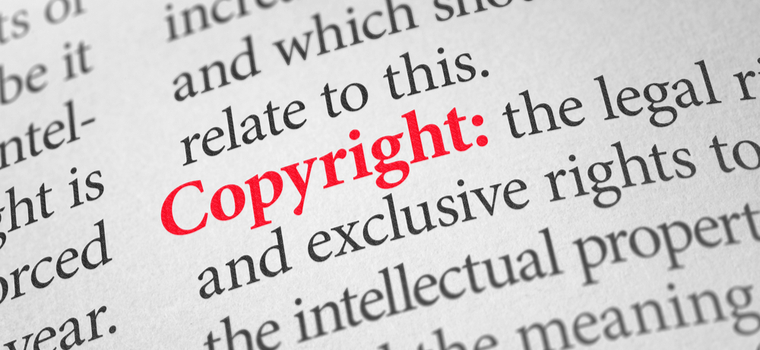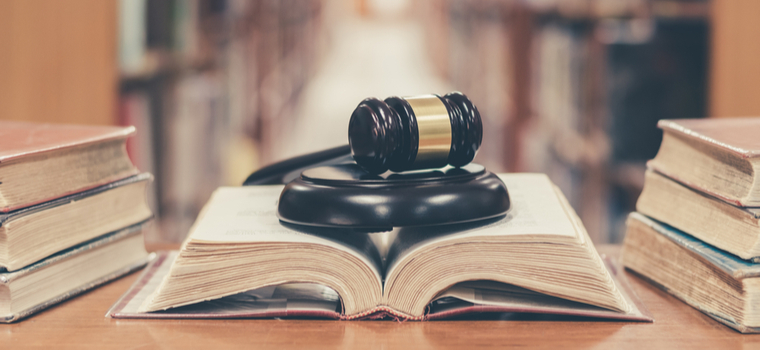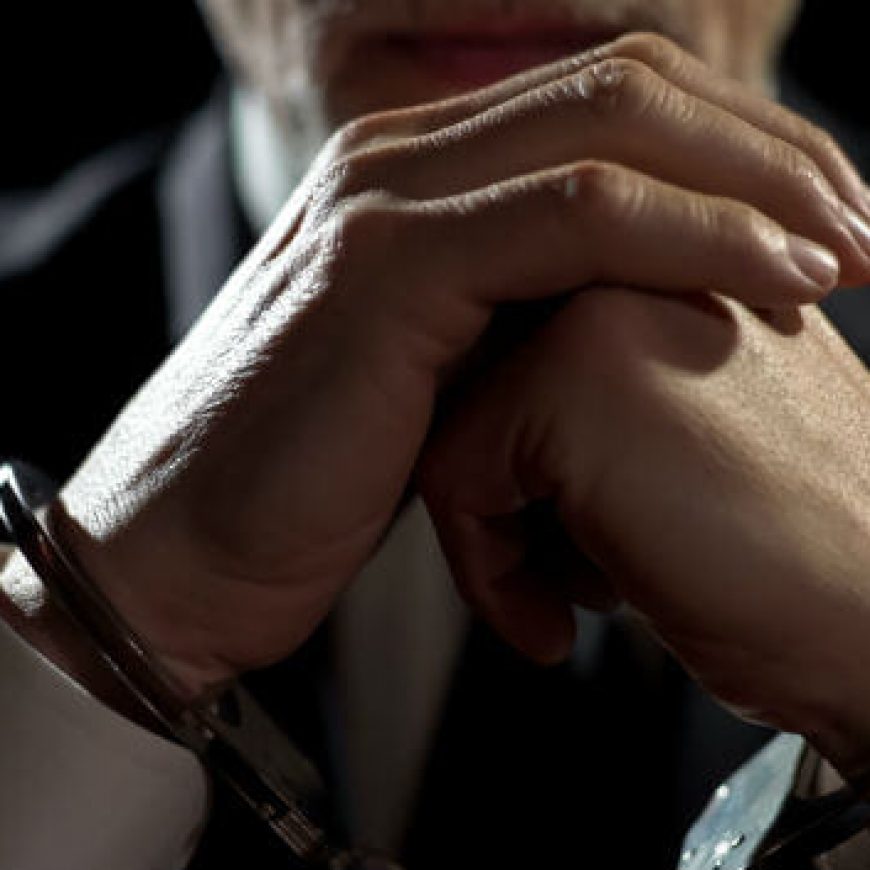Copyright, like trademark and patent, is a type of intellectual property protection designed to safeguard the creator, owner, or holder’s exclusive right to claim an original work as their own. Copyright is protected by laws passed by Congress, giving it preemptive power over state laws and making it the law of the land across all 50 United States.
In order to be subject to copyright, a “work” has to be fixed in a “tangible medium of expression” per Section 102 of the U.S. Copyright Act. A tangible medium means printed on paper, captured on film, saved as a digital file, or otherwise put into a form that can be heard, seen, touched, or read. Some examples of categories of copyrighted material include:
- Works of literature
- Dramatic plays, musicals, and operas
- Songs and other sound recordings
- Television shows, movies, and other film recordings
- Broadcasts, such as live programming
- Databases
- Computer programs, websites, and apps
What Does Copyright Infringement Mean?
Copyright infringement happens when an individual who is not the creator, owner, or holder of a copyright: copies, publishes, transmits, exhibits, distributes, modifies, displays, or otherwise uses a work as if it were their own.
Infringement claims often involve the infringer making money off of the copyrighted work, however, an infringement claim may be brought whether or not profit is involved.
There are many forms of breach of copyright law. The following are examples of copyright infringement if carried out without obtaining permission from the creator, owner, or holder of the copyright:
- Plagiarizing sections of a work of literature in an academic paper without proper attribution
- Copying text from a competitor business’ website and pasting it on your website
- Copying and selling a book
- Recording and posting a performance of a theatrical event
- Downloading songs without paying for a license
- Hosting a public viewing of a movie at your home
- Recording a movie in the theater with a digital camcorder or smartphone
- Recording and posting on YouTube portions of a TV show
- Building a database from a social media network and then e-mailing the users
- Uploading computer programs to a file-sharing service
- Making a commercial using a copyrighted song in the background
- Creating merchandise for sale that features copyrighted words or images without a royalty agreement in place with the owner
Different Types of Copyright
As explained in Section 106 of the U.S. Copyright Act, copyright is not one right, but is instead a “bundle of exclusive rights.” Copyright provides the owner of the copyright the exclusive rights to:
- Reproduce the work in copies
- Prepare derivative works based upon the work
- Distribute copies of the work to the public by sale or other transfer of ownership
- Distribute copies of the work to the public by rental, lease, or lending
- Perform the work publicly
- Display the work publicly
As copyright includes different rights, copyright may also be different based upon who holds the copyright. While the holder can be the person who created the work, for example, the musical artist who wrote and recorded a song, copyright may also belong to two other groups of people:
- The employer of the creator, if the person signed an employment agreement or is subject to a company policy where inventions are the property of the company
- The commissioner of the work, if a person asks another person to create something and the creator agrees in writing that the commissioned work will be the property of the commissioner. In such cases, it may be the record label, or, another artist who holds the copyright for the recorded song.
No matter who the holder is, copyright lasts a long time – for 70 years after the death of the author of artistic, musical, dramatic, and literary works; for 70 years after the death of the last of a film’s director, screenwriter, dialogue author, and score composer; and for 50 years from the date of creation for sound recordings and broadcasts.
Exceptions to Copyright Infringement
There are ways around copyright infringement that allow limited use of copyright works without the copyright owner’s permission, set forth in Section 107 of the U.S. Copyright Act. These are often called “fair use” exceptions and include the following:
- Non-commercial research
- Scholarship
- Private study
- Criticism
- Satire
- Comment
- News Reporting
To determine whether a use is fair, a court facing a copyright challenge would look at four factors outlined in Section 107 of the U.S. Copyright Act:
- the purpose and character of the use, including whether such use is of a commercial nature or is for nonprofit educational purposes
- the nature of the copyrighted work
- the amount and substantiality of the portion used in relation to the copyrighted work as a whole
- the effect of the use upon the potential market for or value of the copyrighted work
Reporting Copyright Infringement
How do you stop copyright infringement when you’re the victim? With the help of a seasoned intellectual property attorney, there is a clear path for how to stop copyright infringement that begins with The United States Copyright Office, the agency of record for all copyright matters. If a person believes that their copyright has been infringed, they should contact the Copyright Office to ensure that their work is registered—if their work is not registered, they may register it for up to three months after the illegal publication of their work (this is how to avoid getting copyrighted, by registering anything you create or own).
If or once the work is registered, the U.S. Copyright Office will have a registration certificate in its files, which provides a “presumption of validity” in any copyright claim. This means that the burden of proof in the lawsuit shifts from the copyright holder to the alleged infringer to disprove that they violated the holder’s copyright. If the copyright holder prevails, they may be entitled to civil statutory damages, criminal fines, and attorneys’ fees.
With a potentially favorable outcome on the horizon with proof of a copyright violation and proof of registration, a copyright owner may want to send a cease-and-desist letter or demand letter to the infringing party before instituting a lawsuit. A simple letter outlining the claims and the damages suffered may obtain a quicker result and will cost less money than a lengthy legal battle, though such a letter is best drafted with the help of an attorney.
Penalties for Copyright Infringement
Officially, copyright infringement penalties are set forth in Sections 502, 504, 505, and 506 of the U.S. Copyright Act and can be both civil and criminal in nature, including:
- Copyright infringement damages
- Actual profits lost as a direct result of the infringement
- Statutory damages of between $750 – $30,000 per item of work infringed upon
- Civil penalties of up to $150,000 per instance of work if intentional or willful infringement
- Criminal penalties of up to $250,000 in fines per offense and up to five years in jail
- Recovery of attorneys’ fees and costs
- Injunctive relief to immediately stop the offense
Tips to Avoid Copyright Infringement
How do you avoid copyright infringement? While by no means an exhaustive list, these suggestions will show you how to avoid breaking copyright laws:
- Review and understand copyright laws and what they protect
- Seek permission from the owner before using a work that isn’t yours
- Do not rely on the symbol defense; a missing © is not required and will not hold up in a copyright claim
- Assume any and all materials found on the internet are copyrighted
Contact the Law Offices of Kretzer & Volderbing P.C. Today
When you are trying to figure out how to navigate copyright issues, you will need Texas lawyers with specific experience with copyright and who have the right knowledge and resources to help you. For copyright infringement help, contact attorney Seth Kretzer today!




